
The primary solution to reducing the number of ‘mass shootings‘ and ‘hate crimes’ and ‘gun violence’ that occur in our country is not another policy or law.
The solution lies in getting to and addressing the root issues that are driving people to conduct these horrific crimes.
These horrible crimes – misuse of guns – are not the problem. They are the symptom of the problem.
The problem is that the hearts of the perpetrators are wounded and fragile. The perpetrators of mass shootings are looking for ways to act out towards others because they are hurting so badly deep on the inside.
ACES and Their Consequences
Research shows this to be true. Adverse Childhood Experiences (ACES) harm children’s developing brains and lead to changing how they respond to toxic and chronic stress and damage their immune systems so profoundly that the effects sometime show up even decades later. ACEs cause much of our burden of chronic disease, most mental illness, and are at the root of much violence.
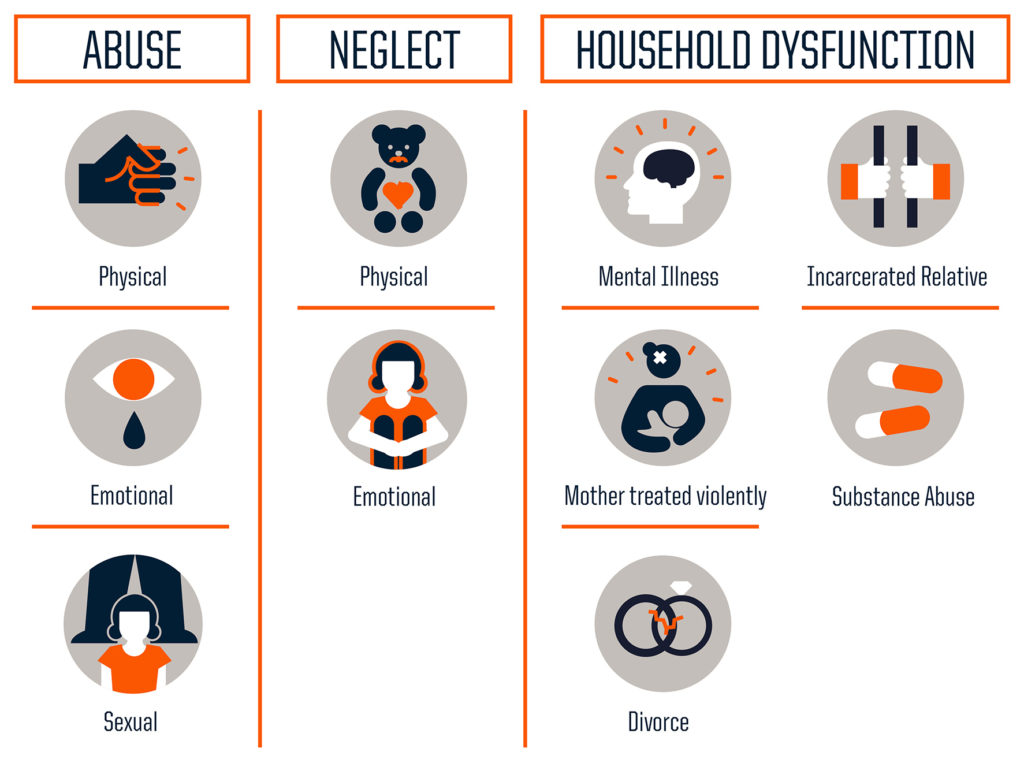
The 10 types of adverse childhood experiences listed above that characterize ACES are wounds to the deepest part of a child – to their heart or spirit. A scripture in the Bible instructs us in this regard.
“Above all else, guard your heart, for everything you do flows from it.” Proverbs 4:23
When one’s heart is wounded, that person’s life will reflect the wounded condition of their heart… unless and until is is healed. And people with wounded hearts often wound other people. They can even shoot other people… sometimes many people at a time in a mass shooting.
“For out of the heart come evil thoughts, murder, adultery, fornication, theft, false witness, slander.” Matthew 15:18-20
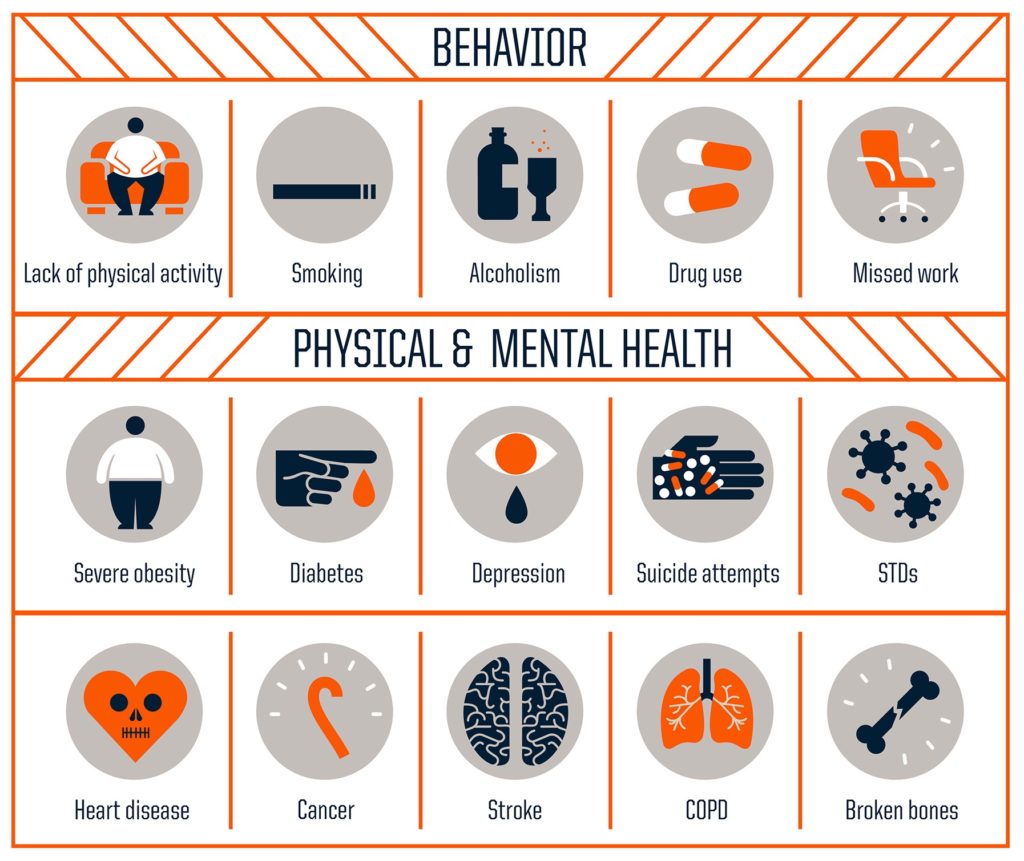
I’m not minimizing the choices and actions of the shooters who engage in gun violence. They are responsible for their actions. Yet as is often said in the ACES community, the attitudes we should have towards the perpetrators should be to wonder “What happened to them?” as opposed to “What’s wrong with them?”
Our society may call these mass shootings ‘hate crimes,’ but at the core, the emotion of hate directed towards others stems from unresolved deep issues of the heart – deep spiritual issues.
Yes, mental illness comes into play here. Again, the research shows that there is a direct relationship between ACE scores and mental illness as seen in the chart below.
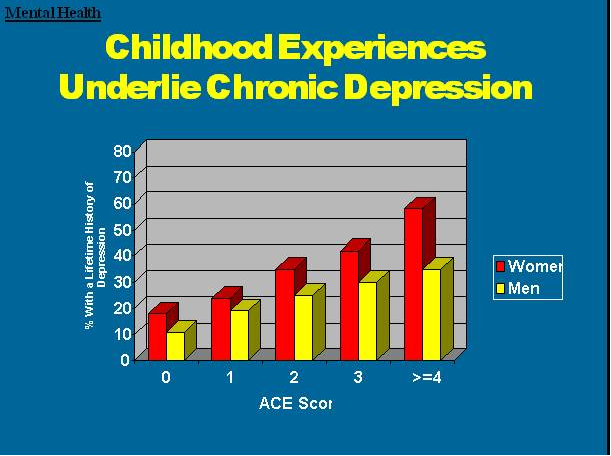
I believe we’ll see that there is also a dose response relationship between ACES scores and gun violence, similar to that of ACES scores and depression as is captured in the above graphic.
ACES and Mass Shootings – The Research
I’m hoping that there is a researcher who has data or perhaps a graph that might show that a relationship does exist between ACES scores and gun violence. NOTE: As I write this post, I’ve learned from a colleague about an article published on August 4th, 2019, in the LA Times titled Op-Ed: We have studied every mass shooting since 1966. Here’s what we’ve learned about the shooters. The following few sentences are from the article: “The vast majority of mass shooters in our study experienced early childhood trauma and exposure to violence at a young age. The nature of their exposure included parental suicide, physical or sexual abuse, neglect, domestic violence, and/or severe bullying. The trauma was often a precursor to mental health concerns, including depression, anxiety, thought disorders or suicidality.”
In fact, the research by the authors of the referenced article above found that 45% percent of mass shooters since 1966 have experienced trauma in childhood – ACES. Their data also show that ‘threats of school violence should be seen as a plea for help.’
To learn more about the research, view this informative six-minute interview conducted August 6, 2019 on CBS News with psychologist Jillian Peterson, co-founder of The Violence Project and co-author of the Op Ed article.
If other research related to mass shootings and ACES does exists, I’d love to learn about it! If little other research has been done, I advocate for such research. Perhaps a researcher who is familiar with ACES can collaborate with the FBI, or another federal agency, to collect and report on the data.
Let’s be clear on one thing, correlation is not causation. Just because there is a strong relationship or correlation between ACES scores and various issues later in life does not mean that one’s early life trauma is the cause of such outcomes/issues. Perhaps future research may demonstrate causation, but that has not yet been the case to date.
ACES Prevention and Resilience
As I’ve mentioned in my opening paragraph, the emphasis in our country should not be placed new policies and laws. Yes policies and legislation related to gun control are important, but I don’t believe that they are the most important solution for reducing mass shootings. Several things need to be addressed and done. Mental health initiatives are important and needed. Exposure to violence in video games and movies and television shows probably play a role in causing gun violence and we should place an emphasis on reducing violent scenes in these and other types of media. Yes, parents should be encouraged to be more involved in the lives of their children. Teachers and supervisors should be better informed on how to look for the ‘tell tell’ signs of high risk individuals and how to report those observations to authorities and to providers of mental health and spiritual care. Many other practical measures such as those I’ve mentioned here can make a difference and should be a part of our strategy to reduce mass shootings.
Resilience plays a hugely important part in addressing this issue. Resilience is the ability to adapt well, or “bounce back” in the presence of difficult life events – events and circumstances such as childhood trauma. Yes, building strong and supportive communities, encouraging the creation of social connections and relationships, and active parenting are all ways to increase the resilience of a young person who has experience early life trauma. These and other commonly employed resilience initiatives are important ‘protective factors’ that play a role in reducing gun violence and mass shootings.
But I believe the emphasis must be placed on prevention and healing at the deepest, personal level…. getting to the root of the problem at hand. By getting to the “heart” of the issue! This, I believe, is the most critical aspect of ACES resilience and prevention.
And the “heart of the issue” is the heart! Adverse experiences and trauma that are experienced in childhood are a form of ‘spiritual risk factors’ for violence, including gun violence and mass shootings.
And spiritual risk factors such as these require spiritual solutions.
ACES and Principles of the Christian Faith
What we most need is a full court press by faith leaders and faith communities to reach those high risk individuals who have wounded hearts and to offer them hope, love, and healing.
The kind of hope, love and healing that our creator God, and his Son Jesus, want to extend to them.
“He (God) heals the brokenhearted and bandages their wounds.” Psalm 147:3
There are many principles that we find in the Bible – God’s love letter to us – that are relevant and need to be experienced by people who have wounded hearts and minds. The graphic below is from a slide I use in many of my presentations related to this topic. It addresses some key principles of the Christian faith that are relevant to many issues of the heart that are likely present in the lives of perpetrators of gun violence and mass shootings.
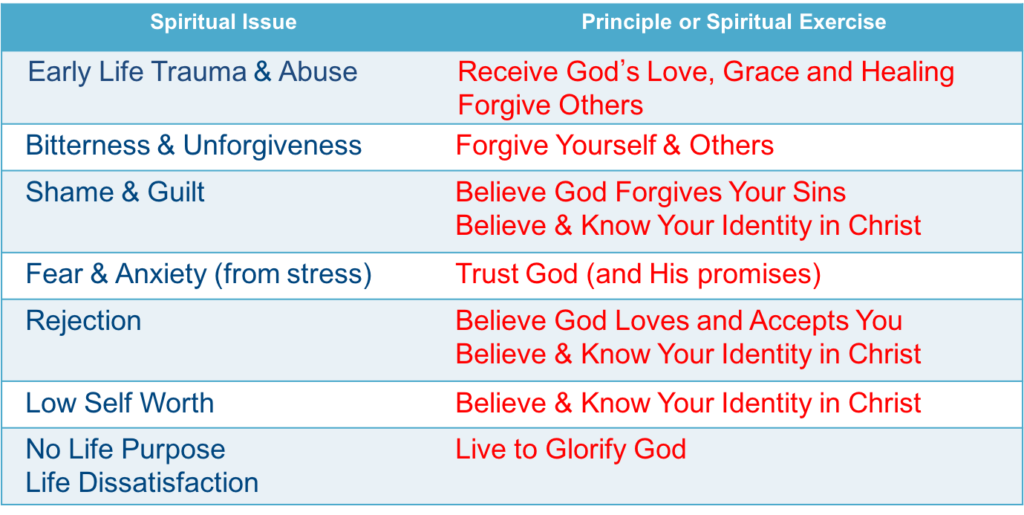
These principles above are among the spiritual solutions that are needed for the types of spiritual issues that mass shooters have. Those who are at risk for conducting mass shootings need to experience these truths and other principles of the Christian faith within the context of loving and supportive communities, communities such as congregations of local churches have to offer.
“I have told you all this so that you may have peace in me. Here on earth you will have many trials and sorrows. But take heart, because I have overcome the world.” Jesus in John 16:33
Leaders of the Christian community and of our local churches have a responsibility to stand in the gap for those who suffer from wounds of the heart. They need to be at the table as key contributors for creating solutions within our communities to this national problem. A few are doing this… but not nearly enough!
Our pastors and ministry leaders need to be intentional in helping those at risk for perpetrating violent crimes such as mass shootings to ‘connect the dots’ between their inclination to hurt people with the condition of their hearts. The local church is the very best setting in which to offer opportunities for increased resilience… through a loving community and by sharing the love of Christ through our actions and by offering initiatives that help people become trauma-informed. In our churches, those who are hurting on the inside have the opportunity to experience genuine love – God’s love and the love others. These loving relationships, these attachments, are needed to help at risk people heal. The initiatives we offer need to address deep spiritual issues such as despair, depression, anger, hatred, loss of hope, and bitterness to name a few.
Oswald Chambers writes in the May 22nd day of his popular devotional, My Utmost for His Highest, “The things that happen either make us evil or they make us saintly, depending on our relationship with God and its level of intimacy.”
Yes, within the church we need to address the kind of mental health issues I’ve named above and to understand that many of these issues stem from deep spiritual wounds. We also need to point at-risk people to an intimate and meaningful relationship with Jesus by which their spiritual needs can be met and the wounds of their hearts can be healed.
“A new heart I will give you, and a new spirit I will put within you; and I will take out of your flesh the heart of stone and give you a heart of flesh.” Ezekiel 36:26
A Prayer for the Hurting People of El Paso, TX and Dayton, OH and Our Country
Be encouraged by viewing and listening to this prayer for comfort, strength and hope by Charles Stanley of First Baptist Church in Atlanta, GA.
Mass Shootings and ACES – A Call to Action Within Our Faith Communities
What are you doing to help people who are at risk for being a mass shooter to meet their deepest spiritual needs and to heal their broken hearts?
What could your church or ministry intentionally do to offer resilience, reduce ACES and to help at-risk people get to ‘the heart of the issue?’
I invite and implore leaders of houses of worship in our nation to be intentional with initiatives and sermons that address traumas of the heart that lead to violence such as mass shootings. And I encourage members of the faith community to become involved with local community efforts that are addressing the prevention of ACES and coordinating resilience initiatives.
Reducing gun violence takes a team effort. And the Christian community must be part of the team!
Mass Shootings and ACES – Related Resources
Another Blog Post – Adverse Childhood Experiences Affect Health – God, Faith and Healing
ACES Connection – A social network involved in a movement to prevent ACES, heal trauma and build resilience.
ACES in The Faith Based Community on the ACES Connection
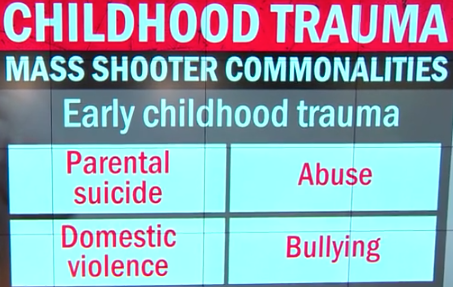







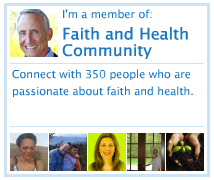
Thank you for this article. I agree there is a “heart” issue in this world and our efforts to fix mass shooting should heavily focus on helping people with “heart” issues.
I wonder about parents and how we could encourage, teach and provide support to give them the courage to get help for their kids who may exhibit hurting behavior in a safe and non-threating environment. I feel that parents see a lot, but are afraid to reach out for help for their kids…somehow trying to protect them.
I also think today’s media needs a good and thorough cleaning. The content that is on tv, at the movies, the internet, and video games are egregious and this is what we are feeding our children’s eyes with….it is very detrimental to their well-being.
I would love to see the church find ways to identify “heart hurting” people and share the love and connection that is available to them through Jesus Christ. What a great focus and mission for a church.
Peace, hope, and love, Amy
I appreciate your reply here Amy. I totally agree that parents play a vital role in this issue! They are crucial! And it seems that we both understand the impact that our media has. In more ways than we can imagine I’ll bet it messes with our sounds and minds. In Christ, Dale
I do agree with most of what you say here. The one thing I disagree is that easy access to guns without any “gates” is a problem here in the U.S. There are countries all over the world that have more trauma than we do, yet they don’t have the number of mass shootings because they don’t have the easy access to guns.
As Christians, we also cannot ignore the climate of racism and “us vs them” mentality that is perpetuated by the President of the Country. People may like his policies on the surface, but his behavior is not something I would EVER say is Christian. He perpetuates lies about the “other” people. Read the manifestos of so many of the people doing these mass shootings. They often name him as a source of their “inspiration”.
We are called to “love our neighbor as ourselves”. Christians need to stop “worshipping” the man in the White House and truly worship God and LIVE the gospel by giving our neighbors the experience of Jesus, not just talking at them.
Hi Anne, I’ve been having technical issues with the comments here so I apologize for the delay in responding. I agree with you concerning the easy access to guns, especially the ‘assault-type’ weapons. Our country does need to tighten up on these laws and the enforcement of them. The focus of my post is getting down to the root issues of what drives a person to conduct these atrocious crimes. Yes, loving your neighbor is the best way to live out the Gospel. I totally agree. And people have hurt and wounded hearts have difficulty ‘loving their neighbors! Be well, Dale
Thank you Dale! Yes, I agree…we need to get to the root of these issues! I appreciate this post very much as I can share it with others.
Blessings,
Anne
Thanks for your comment Anne. And I’m glad that you found it helpful. Have a terrific day! ~ Dale